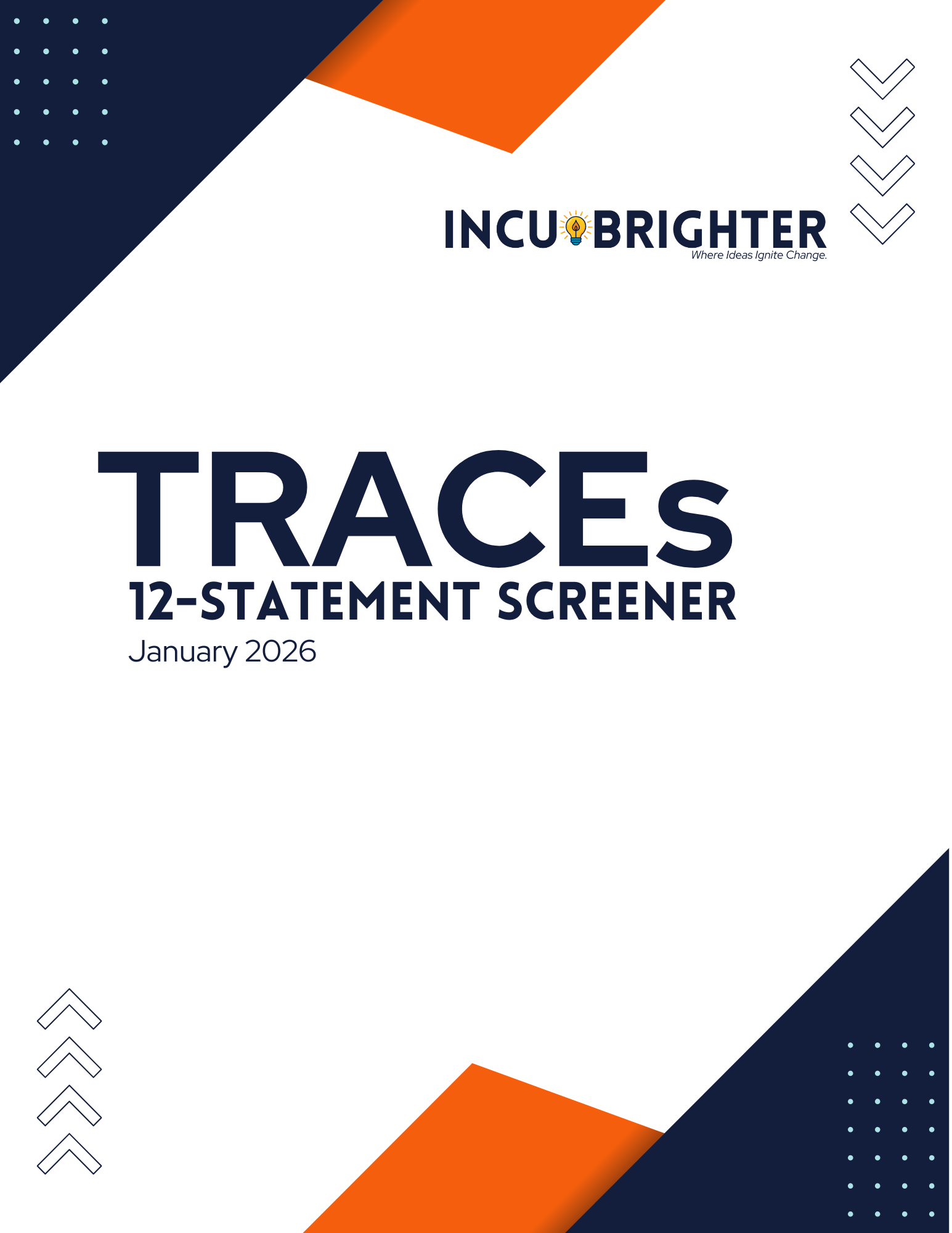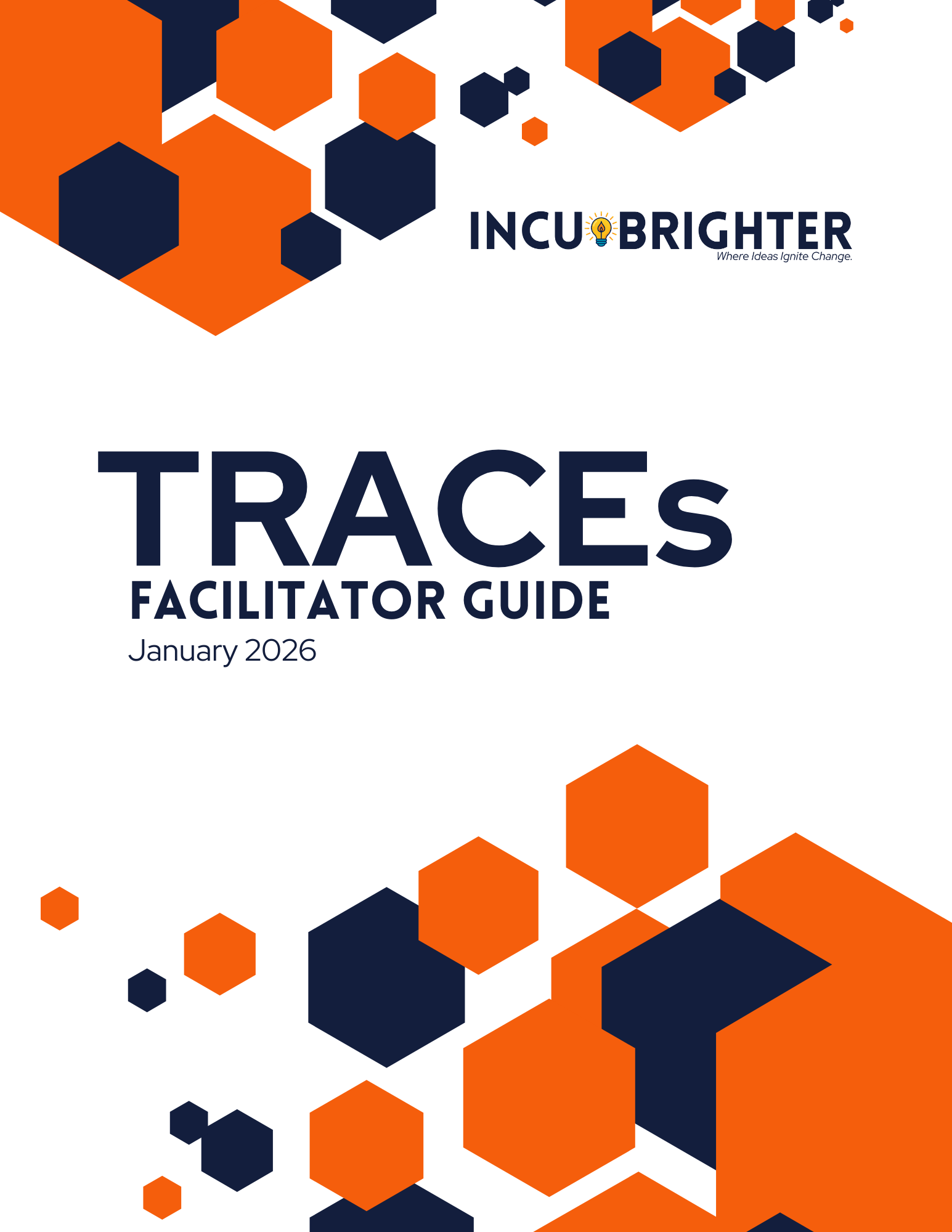TRACEs is grounded in IncuBrighter’s ethical foundation:
once we perceive someone’s context, we become responsible for responding to it with clarity, compassion, and appropriate support.
TRACEs makes that clarity possible.
caregivers of complex youth deserve programs that support them.
TRACEs
TRACEs is currently being piloted and is in development for public use.
For more information on TRACEs and how to be a part of the pilot program, please contact us.
TRACEs (Trauma and Relational Adversity in Caregiving Environments) is IncuBrighter’s assessment framework designed to help professionals understand the full ecological context surrounding youth and families who interact with multiple systems. Instead of focusing on individual pathology, TRACEs examines the environment the caregiver of a complex child is living inside: their caregiving structure, relational stability, system involvement, safety factors, and emotional load.
TRACEs was built because traditional trauma assessments often miss the conditions that matter most—the chronic instability, system fragmentation, caregiver burnout, and cumulative adversity that shape how families of complex youth cope, behave, and survive.
It describes the conditions surrounding them, offering a clearer understanding of:
the pressures shaping caregiver behavior
instability, conflict, or systemic strain within the home
relational ruptures and bonds
environmental predictability and safety
the role of multi-system involvement (SUD, mental health, education, juvenile justice, child welfare, etc.)
the emotional and logistical demands placed on youth and caregivers
gaps in support that affect functioning and wellbeing
The goal is simple: help practitioners see the whole story, so interventions are aligned with reality.
use TRACEs
The TRACEs Screener offers a focused lens on the invisible burdens carried by caregivers of multi-system-involved (or need-complex) youth. By highlighting patterns of relational stress, system fatigue, and emotional depletion, the Screener helps providers, peer supporters, and care teams understand when a caregiver may need stabilization, collaborative planning, or deeper conversation.
The TRACEs Assessment offers a focused lens on the invisible burdens carried by caregivers of multi-system-involved youth. By highlighting patterns of relational stress, system fatigue, and emotional depletion, the Assessment helps providers, peer supporters, and care teams understand when a caregiver may need stabilization, collaborative planning, or deeper conversation.
The Full TRACEs Assessment contains 72 questions across six domains using a 0-4 Likert scale. This comprehensive tool provides detailed insight into the degree and location of caregiver trauma
As a family supporting professional, you stand in a unique position—you understand the weight of multi-systemic caregiving from lived experience, and you bring that wisdom into spaces where caregivers are often overlooked, misunderstood, or asked to simply 'hold on a little longer.'
This guide will equip you with the knowledge and tools to administer the TRACEs Assessment with confidence, compassion, and clarity. More importantly, it will help you recognize when caregivers are not just stressed—they are trauma-activated—and how to respond with the dignity and support they deserve.
If you are interested in being a data contribution partner, Please fill out the partnership request form
support traces
Caregiver trauma is invisible—until we make it visible.
TRACEs is free to use because caregivers in crisis can't wait for systems to catch up. But building the evidence base, training programs, and advocacy work that drives systemic change requires resources.
Your donation powers:
✓ Research that proves caregiver trauma is real and measurable
✓ Training scholarships for programs that can't afford paid workshops
✓ Data infrastructure that shows patterns across thousands of families
✓ Policy briefs that push for better caregiver support
When you give to TRACEs, you're investing in the caregivers just out of frame—the ones absorbing the chaos, holding the pieces, and often breaking in silence.
IncuBrighter is a 501(c)(3) nonprofit organization. Your donation is tax-deductible to the fullest extent permitted by law.



